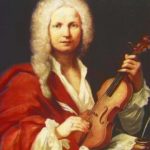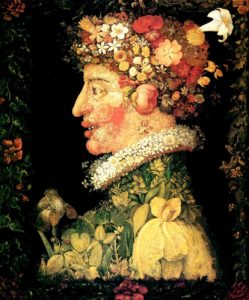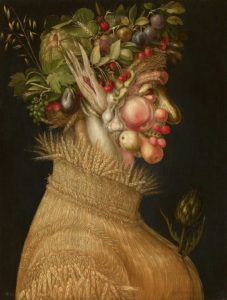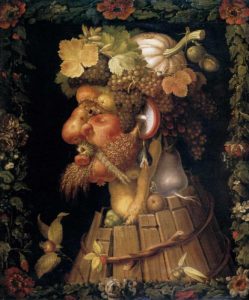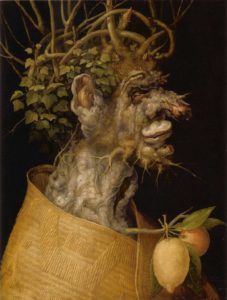Vivaldi, the 4 Concertos and the 4 Sonnets
Antonio Vivaldi (1678-1741) wrote his famous four concertos as one of the earliest examples of “program music” or music that follows a narrative without performed words or dramatic action. These four sonnets about the seasons have been printed with the musical score of Vivaldi’s Four Seasons since the first edition, published in Amsterdam in 1725. It is not known if Vivaldi himself wrote these sonnets but chances are good that he did, or at least collaborated on them, since the music and the sonnets follow each other so closely and there is no other author credited.
The Four Seasons are among the most popular musical compositions in the world and these sonnets are often printed with concert programs and album notes. While these verses may not be considered important in the history of Italian literature, their fame is great due to the popularity of the music. I have put the original Italian texts under each translation, for reference.
My listening guide to the Autumn concerto is on a separate page on this site. It begins with the translation of the sonnet, but also contains extracts of the musical score to show how the music illustrates the story told in the sonnet and all of that material demands its own space.
Public appearances of these translations:
These translations have been presented along with concert performances of the Four Seasons in Singapore; Bloomington, Indiana; Vancouver, Canada and on the BBC in the UK and worldwide. I invite producers of concerts or recordings to request permission to use my translations of these sonnets in concerts, for live reading to accompany a concert, for projection onto large screens or for printing onto programs or album notes.
My Translation of the Autumn Sonnet Read on BBC Radio 4
The BBC Radio 4 program Something Understood of November 25, 2018, featured my translation of Vivaldi’s Autumn sonnet. Something Understood is a Sunday evening feature show about spirituality and religion, covering a wide range of philosophical topics through many different traditions and points of view. BBC Radio 4 is a very popular and highly respected national radio channel in Great Britain, that broadcastss a wide range of news, history, drama, comedy, and popular science. The producers of an episode about Autumn found my translation and judged it to be the one they wanted to use in their production, so I was happy to grant the rights.
Here is the translation, as it was heard in Something Understood. I don’t know who performed the reading but she does a wonderful job with the words. (The episode was about contemplating the more peaceful autumnal themes, and they actually didn’t use the last stanza, about the hunt, so that part is not read.)
The profile illustrations of the four seasons are by Giuseppe Arcimboldo (1526 – 1593) and were painted about 150 years before Vivaldi lived.
SPRING Sonnet for Opus 8 No. 1 in E major, “La primavera”
(c) 2016 Christopher DiMatteo. All rights reserved.
(Allegro)
Spring has arrived, with its fun festive airs
The birds sing out a sweet song!
The spring waters, also the whispering breezes,
Make a sweet murmur as they flow along.
A dark cover then falls over the sky,
Thunder, lightning, as if calling the chosen
Then that quiets down, the birds return
And go back to singing their songs.
(Largo)
Later, out on the flowering meadow,
Under soft-rustling branches and leaves,
The goat-herder sleeps beside his faithful dog.
(Allegro)
Bagpipes play their celebrations
Nymphs and shepherds dance all ’round
Beneath the brilliant Springtime sky.
PRIMAVERA
(Allegro)
Giunt’ è la Primavera e festosetti
La Salutan gl’ Augei con lieto canto,
E i fonti allo Spirar de’ Zeffiretti
Con dolce mormorio Scorrono intanto:
Vengon’ coprendo l’aer di nero amanto
E Lampi, e tuoni ad annuntiarla eletti
Indi tacendo questi, gl’ Augelletti;
di nuovo al lor canoro incanto:
(Largo)
E quindi sul fiorito ameno prato
Al caro mormorio di fronde e piante
Dorme ‘l Caprar col fido can’ à lato.
(Allegro)
Di pastoral Zampogna al suon festante
Danzan Ninfe e Pastor nel tetto amato
Di primavera all’ apparir brillante.
SUMMER Sonnet for Opus 8 No. 2 in G minor, “L’estate”
(c) 2016 Christopher DiMatteo. All rights reserved.
(Allegro non molto – Allegro)
Under the harsh burning summertime sun
The shepherds, the flock and the pines steep in heat
The cuckoo bird loudly unleashes his song
Turtledoves, goldfinches each add their voices
The soft zephyrs blowing, the sudden arrival of
Boreas, bringing a sudden north wind,
The shepherd is worried, out in the open,
Afraid of the storm and of what it might bring.
(Adagio e piano – Presto e forte)
The fear of the furious thunder and lightning
Saps the strength from the shepherd’s tired limbs
With swarms of flies and of gnats all around him.
(Presto)
His fears come to life, unfortunately,
The thunder and lightning and hail from the sky
Knock the heads off the wheat and the other tall grasses.
ESTATE
(Allegro non molto)
Sotto dura stagion dal sole accesa
Langue l’huom, langue ‘l gregge, ed arde ‘l pino,
Scioglie il cucco la voce, e tosto intesa
Canta la tortorella e ‘l gardellino.
Zeffiro dolce spira, ma contesa
Muove Borea improvviso al suo vicino;
E piange il Pastorel, perché sospesa
Teme fiera borasca, e ‘l suo destino;
(Adagio)
Toglie alle membra lasse il suo riposo
Il timore de’ lampi, e tuoni fieri
E de mosche, e mosconi il stuol furioso:
(Presto)
Ah che pur troppo i suoi timor sono veri
Tuona e fulmina il cielo grandinoso
Tronca il capo alle spiche e a’ grani alteri.
AUTUMN Sonnet for Opus 8 No. 3 in F major, “L’autunno”
(c) 2016 Christopher DiMatteo. All rights reserved. See also my listening guide to the Autumn concerto, here.
(Allegro)
They dance and sing the Villanelle,
And celebrate the finished harvest
Their fires lit by Bacchus’ liquor
And all their pleasure ends in sleep
(Adagio molto)
Let all of us leave the songs and dances
In the cool and crisp and pleasing air
The season invites us all
To peaceful sleep and fine enjoyment.
(Allegro)
The hunters are ready just before dawn
With horns and rifles and a small pack of dogs,
Their prey flees quickly, they follow its scent,
Now they surprise it, stunned by the noise,
Of the rifles and dogs, it tries to fight back
But weakened by fleeing, it struggles and dies.
AUTUNNO
(Allegro)
Celebra il Vilanel con balli e Canti
Del felice raccolto il bel piacere
E del liquor di Bacco accesi tanti
Finiscono col Sonno il lor godere
(Adagio molto)
Fa’ ch’ ogn’ uno tralasci e balli e canti
L’ aria che temperata dà piacere,
E la Staggion ch’ invita tanti e tanti
D’ un dolcissimo sonno al ben godere.
(Allegro)
I cacciator alla nov’alba à caccia
Con corni, Schioppi, e cani escono fuore
Fugge la belva, e Seguono la traccia;
Già Sbigottita, e lassa al gran rumore
De’ Schioppi e cani, ferita minaccia
Languida di fuggir, mà oppressa muore.
WINTER Sonnet for Opus 8 No. 4 in F minor, “L’inverno”
(c) 2016 Christopher DiMatteo. All rights reserved.
(Allegro non molto)
Frigid and shivering in the new fallen snow,
Relentlessly blowing, terrible wind
Pounding our feet as we run, to keep warm,
The air is so cold that it makes our teeth chatter.
(Largo)
Spending the day sitting still by the fire,
with heavy rain falling outside.
(Allegro)
Walking across the hard frozen ice,
Carefully stepping, we try not to fall
One quick turn and you fall to the ground
Getting back up, running again,
So the ice does not break apart under our feet
All the winds raging, Scirocco and Boreas,
All this is Winter, with joys of its own.
INVERNO
(Allegro non molto)
Agghiacciato tremar tra nevi algenti
Al Severo Spirar d’ orrido Vento,
Correr battendo i piedi ogni momento;
E pel Soverchio gel batter i denti;
(Largo)
Passar al foco i dì quieti e contenti
Mentre la pioggia fuor bagna ben cento
(Allegro)
Caminar Sopra il ghiaccio, e a passo lento
Per timor di cader girsene intenti;
Gir forte Sdruzziolar, cader a terra
Di nuovo ir Sopra ‘l giaccio e correr forte
Sin ch’ il giaccio si rompe, e si disserra;
Sentir uscir dalle ferrate porte
Scirocco, Borea, e tutti i Venti in Guerra
Quest’ è ‘l verno, ma tal, che gioja apporte.
Translations and comments (c) 2016 Christopher DiMatteo. All rights reserved.
All four of the Arcimboldo images come from Wikipedia and are in the public domain in the US. The works are in the Musée du Louvre in Paris.

